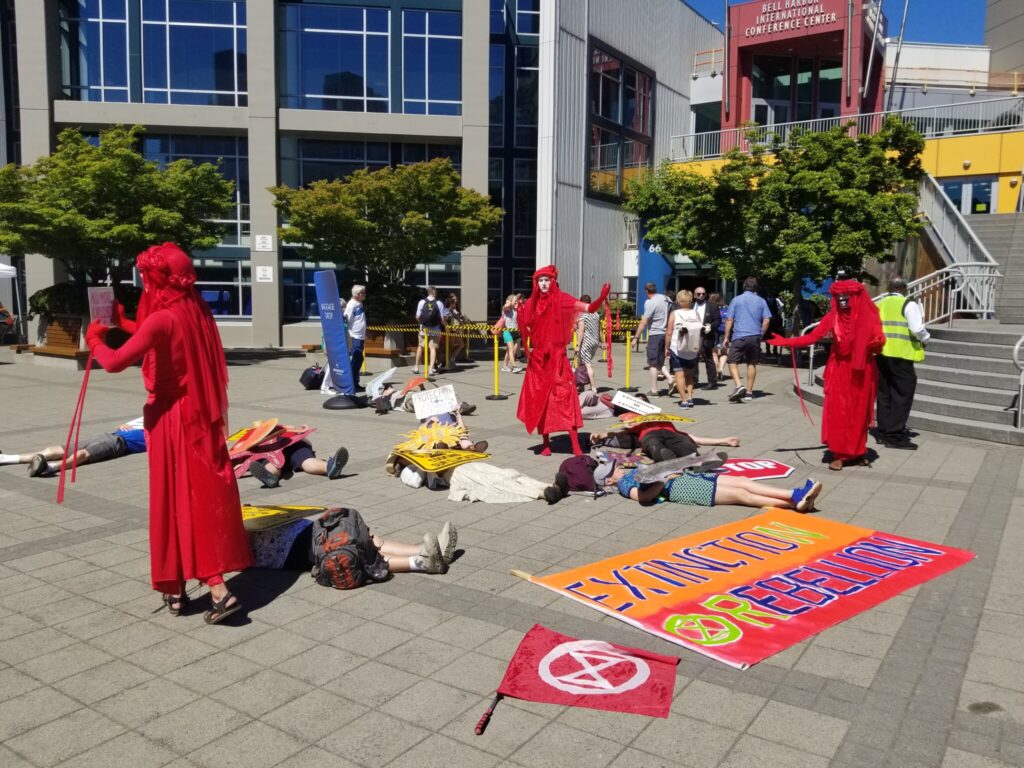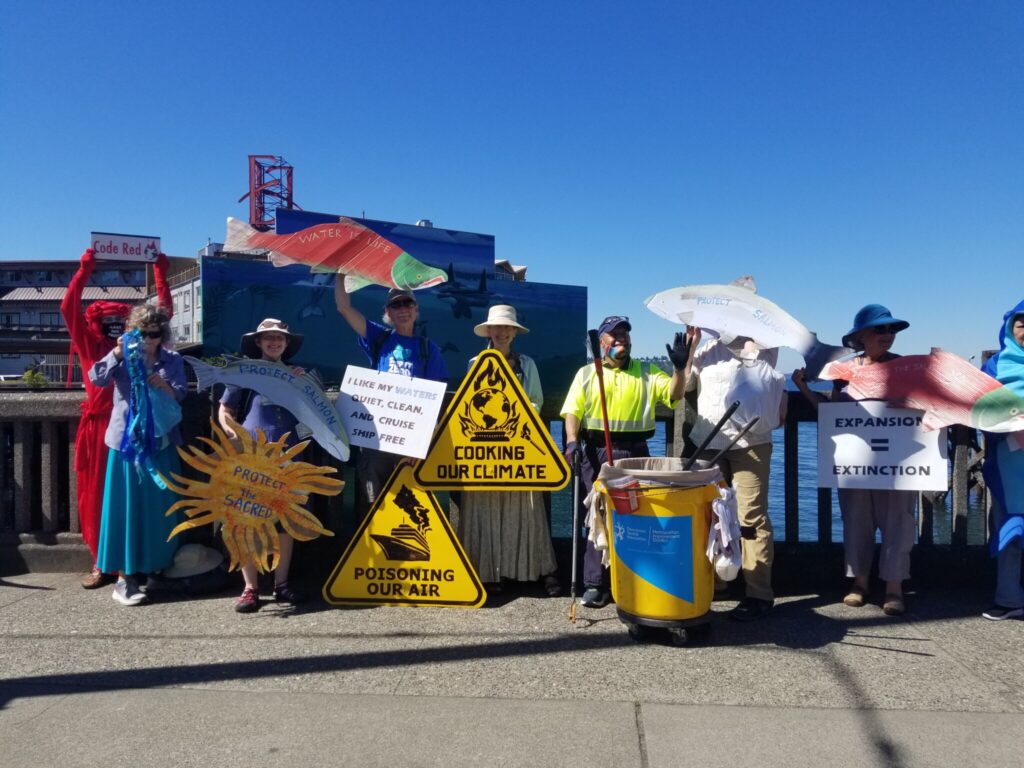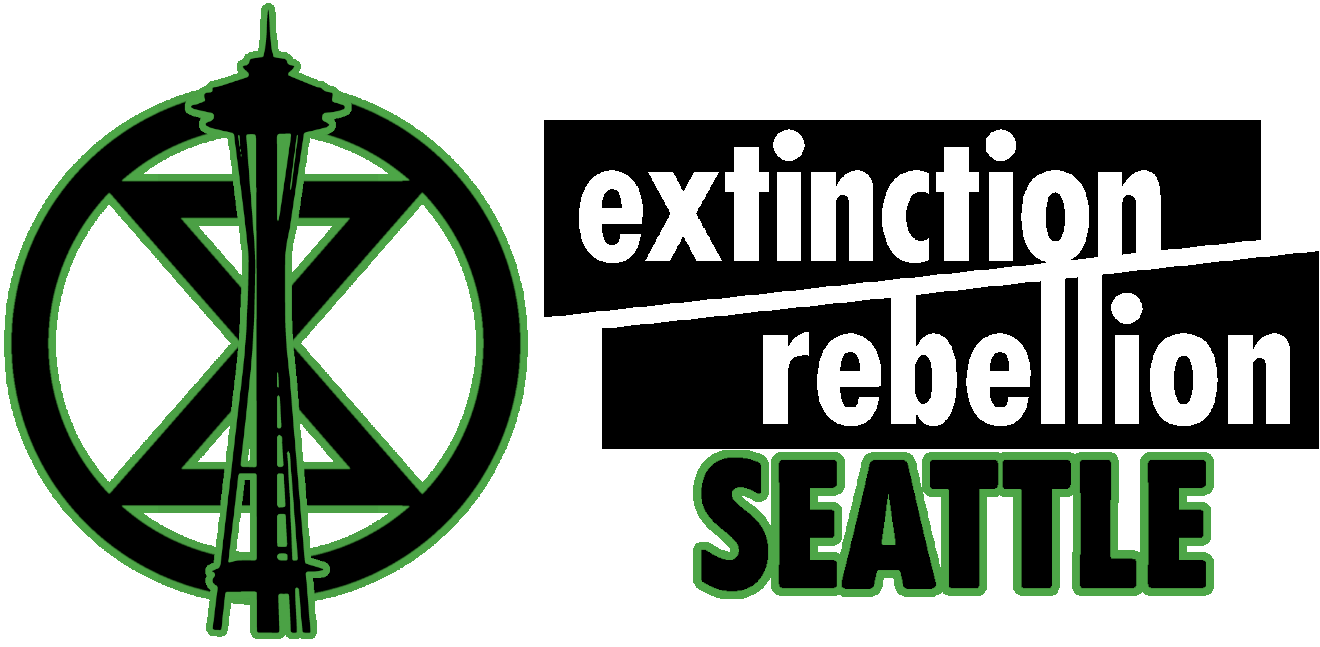WHAT: Members of Extinction Rebellion Seattle and Seattle Cruise Control continue to disrupt business as usual at Pier 66 Cruise Terminal with a die-in and rally, to call attention to the harms of massive cruise ships and demand a cruise-free Salish Sea. Adding to the dramatic effect of the dolphin costumes and painted sea creatures will be The Red Rebels of XR (Extinction Rebellion) Seattle with performance art representing the blood, love and rage we feel facing biodiversity loss, impacts to human health and the climate impacts of cruises and their corresponding flights to and from Seattle.
WHEN: Sunday June 26th at 10:45am
WHERE: Cruise Terminal at Pier 66 on the Seattle Waterfront.
The Port of Seattle has been bragging about their proposal of a Green Cruise Corridor to Alaska, to reduce greenhouse gas(GHG) emissions by 2050, however, this voluntary agreement is too little, too vague and too late. The City of Seattle has a goal of reducing GHG’s 58% by 2030; the International Panel on Climate Change (IPCC) has stated we need to reduce emissions by about 50% by 2030; therefore the Port needs to bring their efforts in line with Seattle and the IPCC. In addition, cruise companies need to voluntarily stop their damage to our climate, waters and communities. However, these exploitative cruise companies are unlikely to internalize the external costs because in doing so it reduces their profit margins. So personally, I want to see a cruise-free Salish Sea.
– Pamela Ng, Seattle Cruise Control member, climate activist and practitioner of Chinese medicine.
All human beings are Earth beings. We co-exist with and are interconnected to all other life forms. We especially depend on the oceans. For example, ocean phytoplanktons produce 50 – 85% of the oxygen we need to breathe. Phytoplanktons are sensitive to ocean warming and acidification and levels of both are rising at alarming rates. The carbon footprint and other harmful impacts of cruising are one of the causes. Our very survival is at risk. Given this, what is our ethical responsibility to safeguard and heal the living systems of the Earth? What are the children of the future asking us to do? These are questions we need to reflect on with our heart every day. And then we need to act on the wisdom that arises. Now – without delay.
– Bridgid Normand. Earth Being, parent and grandmother.
We can create our destiny and heal our world if we collectively wake up and realize that we human beings aren’t separate from the web, but merely one strand within it. If we ignore the warnings and continue to consume and trash the world, fouling the oceans and air, tearing the web of life, we will not survive. We will weep tears of sorrow as we watch our home Planet get sicker and sicker with fevers, shaking, flooding, violent winds and more deadly Pandemics. If we are to survive, non-essential fossil fuel transportation with massive polluting ships needs to end now. And that’s why we are here today, standing beside this floating city called a cruise ship, bringing this die-in performance to you, to raise awareness of the many harmful impacts of the cruise ship tourism business model and to invite the possibility for change.
– Jordan Van Voast, Licensed Acupuncturist, and member of Seattle Cruise Control.
BACKGROUND: Extinction Rebellion Seattle uses Non Violent Direct Action to tell the truth about the Climate and Ecological Emergency we are facing. We oppose the expansion of the cruise industry in Seattle, and promote a cruise-free Salish Sea. Port Commissioners and staff continue to speak positively of cruise tourism as an economic engine — while ignoring the impacts to health, climate, water, and marine life, as well as the exploitation of onboard hospitality workers.
- Cruise ship emissions contain carcinogens, toxins, and particulate matter, harming the health of workers, passengers, coastline communities and destination communities, contributing to heart disease, asthma, cancer and premature death.
- Cruise ships are three times as polluting as airplanes per passenger mile – needing to use between 30-50 gallons of fossil fuels to travel just one mile.
- The Port of Seattle estimates that between 80% to 90% of cruise passengers arrive through Seattle-Tacoma International Airport. In 2019, greenhouse gas emissions for the six-month cruise season and its associated flights totaled between 1.6 and 2.1 million tons – equal to about one-third of the emissions of the entire city of Seattle for the whole year.
- Ship noise impedes the ability of marine mammals to communicate and hunt for food; ships also dump plastic trash, sewage, and fuel oil contaminants directly into the ocean.
- Unlimited cruise ship stopovers at local communities can overwhelm those communities, driving local businesses out, and degrading local infrastructure.
- Cruise ships fly flags of convenience, avoiding taxes and bypassing US labor protections. Onboard hospitality staff often only earn about $2/hour, while working seven days a week, for over 10 hours a day.
- In 2020, as COVID outbreaks halted cruise travel, tens of thousands of workers were stuck at sea for months on end, often without pay, after passengers were evacuated — even as cruise executives made bonuses higher than in previous years.
PHOTOS:



